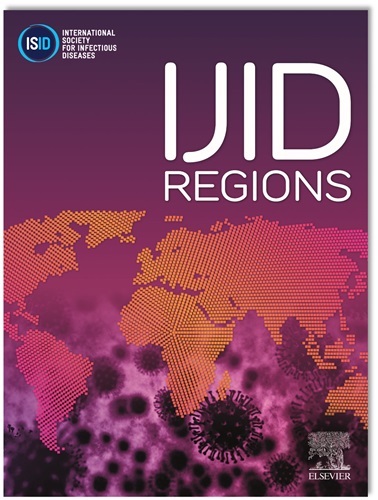Antiviral Therapeutics Discovery for Enterovirus D68.
IF 4.8
2区 医学
Q1 INFECTIOUS DISEASES
引用次数: 0
Abstract
Introduction
Enterovirus D68 (EV-D68) can cause a spectrum of clinical symptoms from mild respiratory symptoms to severe disease which can lead to hospitalization and even fatality in the immunocompromised, the elderly, and young children. To date, there are no effective antiviral successfully developed for enterovirus infection and the current understanding on pathogenesis is limited, which has resulted in the persistent circulation and outbreaks across the globe.
Methods
An immunofluorescence-based phenotypic high-throughput antiviral screen was performed on both RD and H1299 cells, where 7,987 compounds across nine commercially-available drug libraries were screened for antiviral activity against Enterovirus D68 (EV-D68) strain US/KY/14-18953. Using a hit threshold of 50% inhibition and a toxicity threshold of nuclei count > 1000, 178 hits were identified. These hits were further filtered for novelty and potency, which led to the validation of 12 compounds. MARVAS DF01 was selected for subsequent experiments due to its high efficacy (IC50: 1.804 µM).
Results
MARVAS DF01 treatment of EV-D68 infected cells potently reduced viral protein and viral genomic RNA levels. The time-of-addition, time-of-removal, and entry bypass studies showed that MARVAS DF01 acts in the post-entry stages of EV-D68 replication, specifically between 4 to 6 hours post-infection. Transfecting a Nanoluciferase viral replicon containing a truncated viral 3D protein still resulted in a luminescence reduction, indicating that MARVAS DF01 affects viral protein translation. Following serial passaging of EV-D68 in the presence of MARVAS DF01, no resistant mutants were found after 18 passages, suggesting the target of MARVAS DF01 to be a host factor. To elucidate the specific target, siRNA knockdown of the four currently known host targets of MARVAS DF01 was performed, from which ULK1 and ULK2 were identified to be involved in EV-D68 replication. As these two proteins are canonically known as part of the autophagy pathway, MARVAS DF01 was investigated for its role in EV-D68-induced autophagy. Through western blot and immunofluorescence staining, the LC3-II/LC3-I ratio and number of LC3 puncta-positive cells increased upon EV-D68 infection, indicating autophagy induction in infected cells. MARVAS DF01 treatment reversed this phenomenon, suggesting its mechanism of inhibition to be through the autophagy pathway. Additionally, MARVAS DF01 is a broad-spectrum enterovirus antiviral, inhibiting the replication of representative viruses from Enterovirus A-D and Rhinovirus A. MARVAS DF01 also reduced EV-D68 replication primary human nasal epithelial cells.
Discussion
Our research has taken a leap into the identification of novel antivirals for EV-D68 and highlight the gap that necessitates further research to devise novel broad spectrum treatment approaches and modalities to thwart human enterovirus infection.
Conclusion
MARVAS DF01 is a potent antiviral for EV-D68 and can serve as a broad spectrum antiviral for human enteroviruses by targeting the host autophagy processes that is essential for human enterovirus replication.
肠病毒D68的抗病毒治疗新发现
肠病毒D68 (EV-D68)可引起一系列临床症状,从轻微的呼吸道症状到严重的疾病,可导致免疫功能低下者、老年人和幼儿住院甚至死亡。迄今为止,还没有针对肠道病毒感染成功开发出有效的抗病毒药物,目前对其发病机制的了解也有限,这导致了肠道病毒在全球范围内的持续传播和暴发。方法对RD和H1299细胞进行基于免疫荧光的表型高通量抗病毒筛选,筛选9个市售药物文库中的7987种化合物对US/KY/14-18953株肠病毒D68 (EV-D68)的抗病毒活性。使用50%抑制的命中阈值和细胞核计数的毒性阈值;1000178个被确认。这些化合物经过进一步的新颖性和效力筛选,最终得到了12种化合物的验证。后续实验选择MARVAS DF01,因为其高效(IC50: 1.804µM)。结果smarvas DF01治疗EV-D68感染细胞可显著降低病毒蛋白和病毒基因组RNA水平。添加时间、去除时间和进入绕道研究表明,MARVAS DF01在进入后EV-D68复制阶段起作用,特别是在感染后4至6小时。转染含有截断的病毒3D蛋白的纳米荧光素酶病毒复制子仍然导致发光减少,表明MARVAS DF01影响病毒蛋白翻译。在MARVAS DF01存在的情况下,对EV-D68进行连续传代,18代后未发现耐药突变体,提示MARVAS DF01的靶点可能是宿主因子。为了阐明特异性靶点,我们对MARVAS DF01目前已知的四个宿主靶点进行了siRNA敲低,从中鉴定出ULK1和ULK2参与了EV-D68的复制。由于这两种蛋白通常被认为是自噬途径的一部分,因此研究了MARVAS DF01在ev - d68诱导的自噬中的作用。western blot和免疫荧光染色显示,感染EV-D68后,LC3- ii /LC3- i比值和LC3点阳性细胞数量增加,提示感染细胞诱导自噬。MARVAS DF01治疗逆转了这一现象,提示其抑制机制可能通过自噬途径。此外,MARVAS DF01是一种广谱肠道病毒抗病毒药物,可抑制肠道病毒a - d和鼻病毒a的代表性病毒的复制。MARVAS DF01还可降低EV-D68复制原代人鼻上皮细胞。我们的研究在鉴定EV-D68的新型抗病毒药物方面取得了飞跃,并强调了需要进一步研究的空白,以设计新的广谱治疗方法和模式来阻止人类肠道病毒感染。结论marvas DF01对EV-D68具有较强的抗病毒作用,可作为一种广谱抗病毒药物,靶向人肠道病毒复制所必需的宿主自噬过程。
本文章由计算机程序翻译,如有差异,请以英文原文为准。
求助全文
约1分钟内获得全文
求助全文
来源期刊
CiteScore
18.90
自引率
2.40%
发文量
1020
审稿时长
30 days
期刊介绍:
International Journal of Infectious Diseases (IJID)
Publisher: International Society for Infectious Diseases
Publication Frequency: Monthly
Type: Peer-reviewed, Open Access
Scope:
Publishes original clinical and laboratory-based research.
Reports clinical trials, reviews, and some case reports.
Focuses on epidemiology, clinical diagnosis, treatment, and control of infectious diseases.
Emphasizes diseases common in under-resourced countries.

 求助内容:
求助内容: 应助结果提醒方式:
应助结果提醒方式:


